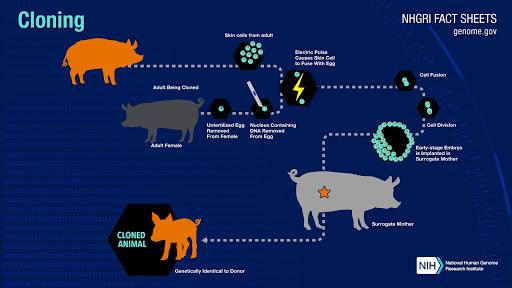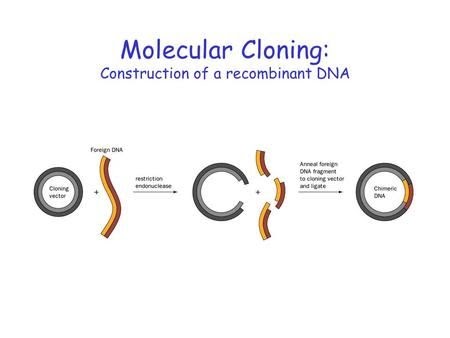
Cloning in America has been an interest of science for hundreds of years. The first attempts in cloning were seen in 1885 on sea urchins. Cloning comes in many forms. Some instances of “clones” occur in nature. Is human cloning on the horizon?
Clones in Nature
Clones that occur naturally range from single cell organisms to identical twins. Organisms such as Planaria (flatworms) reproduce through a process called Binary Fission. The organism splits apart creating a clone-like copy of itself. Fragmentation, the process of growing a new organism from a separated fragment of the parent organism, occurs commonly in starfish. Identical twins are formed when a fertilized egg splits and develops into two organisms who are genetically the same. What happens when science interferes and attempts to create organisms who are genetically the same?
Cloning Plants
Some plants can naturally reproduce through asexual reproduction. This process can occur for many reasons such as a stolon, or runner, rooting from a new bud. We have helped this process along for thousands of years. Plant cuttings can often be rooted and create clones of the mother pant. Some plants such as tomatoes create plenty of auxins, the hormone plants need to start rooting, other needs help from artificial rooting hormones. “Clones” rooted from cuttings often mature faster than their counterparts who start out as seeds. There are no laws against cloning plants. In a survey of 100 Americans 71 believed cloning plants was ethical. In 2016 the Michigan court of appeals deemed Marijuana “clones” as plants. Scientists are currently looking for a way to create clones of original plants through the seeds they create. This would be a major breakthrough in agriculture. Cloning crops with higher yields could help with the world hunger crisis if more food is able to be produced. What would happen if we applied the same idea to animals who are generally used for food?
Cloning Animals

Cloning animals started in 1855 when Hans Adolf Eduard Driesch discovered he could split a two-celled sea urchin embryo and both cells would develop into an individual organism. In 1996 Dolly the sheep became famous for being the first cloned mammal born at the Roslin Institute in Scotland. Since then animal cloning has been a commercial venture to improve the quality of herds. The FDA has deemed meat and milk from cloned animals and their offspring to be safe to consume. The FDA says most cloned livestock are used for breeding then the offspring are used for processing. It is not required for food labels to specify if a product comes from a clone or their offspring. There is a huge controversy over the ethical side of cloning animals. In a survey out of 100 Americans 76 people said cloning animals was not ethical. After taking the survey some people reported back they would only be okay with cloning animals who were endangered in order to repopulate those species. Five people who originally said yes reported they confused the process of artificial insemination with cloning and said removing the genetic traces from an egg is not ethical. Let’s not get confused, what types of cloning are out there and how do we use them?
Types of Clones
There are three different types of artificial cloning. Molecular cloning produces clones of genes or segments of DNA. Reproductive cloning produces clones of whole organisms. Therapeutic cloning produces stem cells for creating tissue to replace diseased or injured tissues. Could any of these types of cloning successfully clone humans?

Cloning Humans in America
Cloning humans has been an interest of science since Dolly the sheep was born; it was the next logical step after animal cloning. Clonaid claimed to have successfully cloned humans resulting in the birth of babies in various countries including the U.S. These babies were never independently verified through DNA and many in the scientific community are skeptical of their claims. Many people on Reddit and TikTok claim to be these babies but none of their claims have been proven. There are no Federal laws that outright ban cloning humans. In a survey of 100 Americans 90 people said they believed cloning humans was not ethical. 20 reported after taking the survey they only agreed with cloning organs or tissues for people who need them. Nine states have legislature banning reproductive cloning, therapeutic cloning, or using any funding to do human cloning. There are currently no proven instances of human cloning but there are instances where therapeutic cloning could be used to benefit patients and the medical community in general. Therapeutic cloning could help cure diseases and is believed to have a lower probability for immune rejection in organ and tissue transplants. Some people believe using stem cells in anyway is “playing God” and not ethical, others say it’s not until you create full human beings. Where is the line for you when cloning in America?
Written by: Erinn Malloy

